LangChain 75 打造你自己的OpenAI + LangChain网页应用
发布时间:2024年01月17日
LangChain系列文章
- LangChain 60 深入理解LangChain 表达式语言23 multiple chains链透传参数 LangChain Expression Language (LCEL)
- LangChain 61 深入理解LangChain 表达式语言24 multiple chains链透传参数 LangChain Expression Language (LCEL)
- LangChain 62 深入理解LangChain 表达式语言25 agents代理 LangChain Expression Language (LCEL)
- LangChain 63 深入理解LangChain 表达式语言26 生成代码code并执行 LangChain Expression Language (LCEL)
- LangChain 64 深入理解LangChain 表达式语言27 添加审查 Moderation LangChain Expression Language (LCEL)
- LangChain 65 深入理解LangChain 表达式语言28 余弦相似度Router Moderation LangChain Expression Language (LCEL)
- LangChain 66 深入理解LangChain 表达式语言29 管理prompt提示窗口大小 LangChain Expression Language (LCEL)
- LangChain 67 深入理解LangChain 表达式语言30 调用tools搜索引擎 LangChain Expression Language (LCEL)
- LangChain 68 LLM Deployment大语言模型部署方案
- LangChain 69 向量数据库Pinecone入门
- LangChain 70 Evaluation 评估、衡量在多样化数据上的性能和完整性
- LangChain 71 字符串评估器String Evaluation衡量在多样化数据上的性能和完整性
- LangChain 72 reference改变结果 字符串评估器String Evaluation
- LangChain 73 给结果和参考评分 Scoring Evaluator
- LangChain 74 有用的或者有害的helpful or harmful Scoring Evaluator
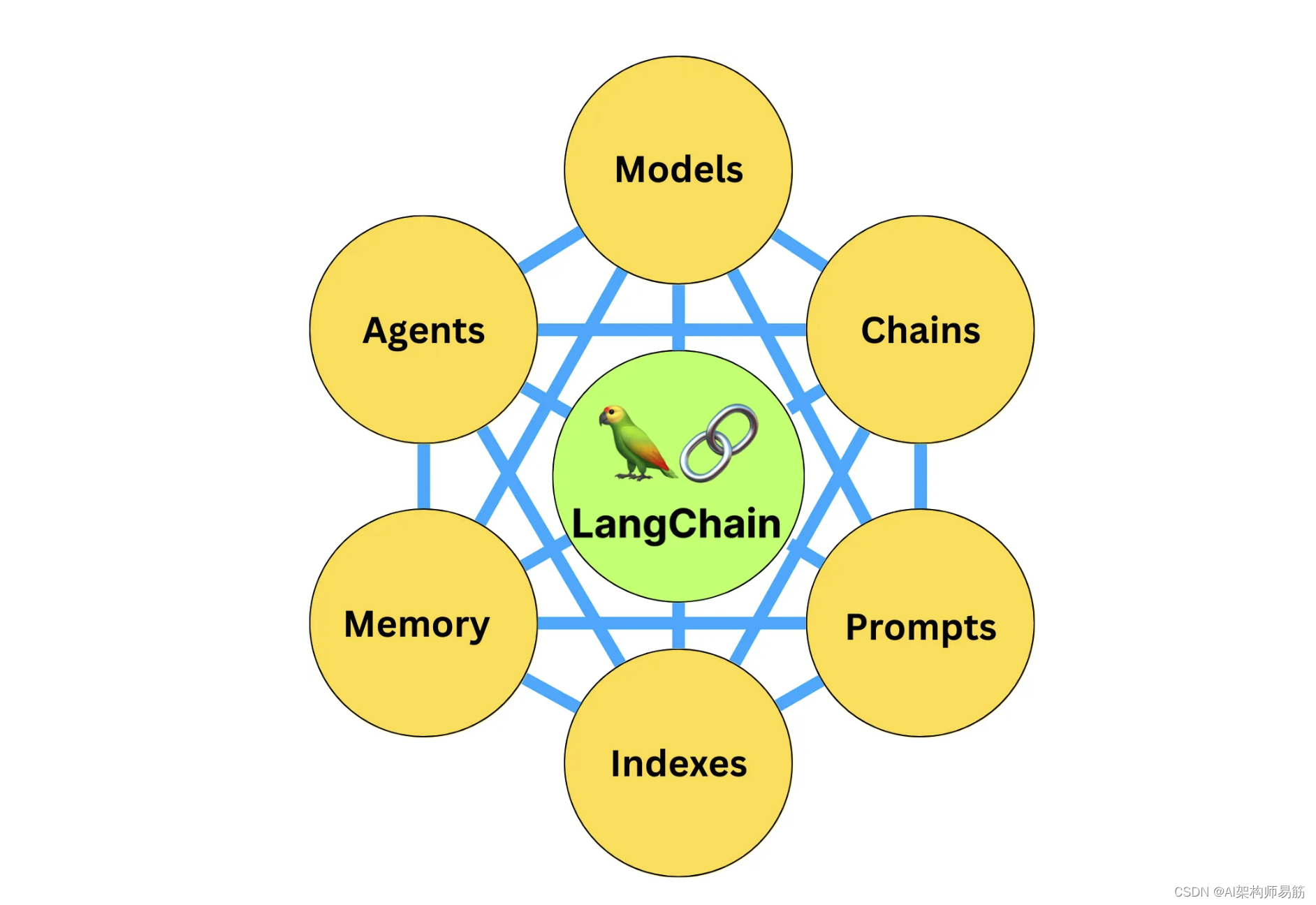
笔者写了优化英文邮件的例子,可以选择英式或者美式英文,并选择正式的口吻或者通知的口吻。
此应用程序旨在部署在 Streamlit请注意,在设置 StreamLit 应用程序时,应确保将 OPENAI_API_KEY 上。 添加为机密环境变量。如果用跳板机,还需要设置OPENAI_API_BASE="https://apejhvxcd.cloud.sealos.io/v1"。 可以参考跳板机文章
1. 代码实现:
main.py 实现
github地址:https://github.com/gkamradt/globalize-text-streamlit
import streamlit as st
from langchain.prompts import PromptTemplate
from langchain.llms import OpenAI
template = """
Below is an email that may be poorly worded.
Your goal is to:
- Properly format the email
- Convert the input text to a specified tone
- Convert the input text to a specified dialect
Here are some examples different Tones:
- Formal: We went to Barcelona for the weekend. We have a lot of things to tell you.
- Informal: Went to Barcelona for the weekend. Lots to tell you.
Here are some examples of words in different dialects:
- American: French Fries, cotton candy, apartment, garbage, cookie, green thumb, parking lot, pants, windshield
- British: chips, candyfloss, flag, rubbish, biscuit, green fingers, car park, trousers, windscreen
Example Sentences from each dialect:
- American: I headed straight for the produce section to grab some fresh vegetables, like bell peppers and zucchini. After that, I made my way to the meat department to pick up some chicken breasts.
- British: Well, I popped down to the local shop just the other day to pick up a few bits and bobs. As I was perusing the aisles, I noticed that they were fresh out of biscuits, which was a bit of a disappointment, as I do love a good cuppa with a biscuit or two.
Please start the email with a warm introduction. Add the introduction if you need to.
Below is the email, tone, and dialect:
TONE: {tone}
DIALECT: {dialect}
EMAIL: {email}
YOUR {dialect} RESPONSE:
"""
prompt = PromptTemplate(
input_variables=["tone", "dialect", "email"],
template=template,
)
def load_LLM(openai_api_key):
"""Logic for loading the chain you want to use should go here."""
# Make sure your openai_api_key is set as an environment variable
# llm = OpenAI(temperature=.7, openai_api_key=openai_api_key)
llm = OpenAI(temperature=.7)
return llm
st.set_page_config(page_title="Globalize Email", page_icon=":robot:")
st.header("Globalize Text")
col1, col2 = st.columns(2)
with col1:
st.markdown("Often professionals would like to improve their emails, but don't have the skills to do so. \n\n This tool \
will help you improve your email skills by converting your emails into a more professional format. This tool \
is powered by [LangChain](https://langchain.com/) and [OpenAI](https://openai.com) and made by \
[@GregKamradt](https://twitter.com/GregKamradt). \n\n View Source Code on [Github](https://github.com/gkamradt/globalize-text-streamlit/blob/main/main.py)")
with col2:
st.image(image='TweetScreenshot.png', width=500, caption='https://twitter.com/zgpeace')
st.markdown("## Enter Your Email To Convert")
def get_api_key():
input_text = st.text_input(label="OpenAI API Key ", placeholder="Ex: sk-2twmA8tfCb8un4...", key="openai_api_key_input")
return input_text
openai_api_key = get_api_key()
col1, col2 = st.columns(2)
with col1:
option_tone = st.selectbox(
'Which tone would you like your email to have?',
('Formal', 'Informal'))
with col2:
option_dialect = st.selectbox(
'Which English Dialect would you like?',
('American', 'British'))
def get_text():
input_text = st.text_area(label="Email Input", label_visibility='collapsed', placeholder="Your Email...", key="email_input")
return input_text
email_input = get_text()
if len(email_input.split(" ")) > 700:
st.write("Please enter a shorter email. The maximum length is 700 words.")
st.stop()
def update_text_with_example():
print ("in updated")
st.session_state.email_input = "Sally I am starts work at yours monday from dave"
st.button("*See An Example*", type='secondary', help="Click to see an example of the email you will be converting.", on_click=update_text_with_example)
st.markdown("### Your Converted Email:")
if email_input:
# if not openai_api_key:
# st.warning('Please insert OpenAI API Key. Instructions [here](https://help.openai.com/en/articles/4936850-where-do-i-find-my-secret-api-key)', icon="??")
# st.stop()
llm = load_LLM(openai_api_key=openai_api_key)
prompt_with_email = prompt.format(tone=option_tone, dialect=option_dialect, email=email_input)
formatted_email = llm.invoke(prompt_with_email)
st.write(formatted_email)
本地运行
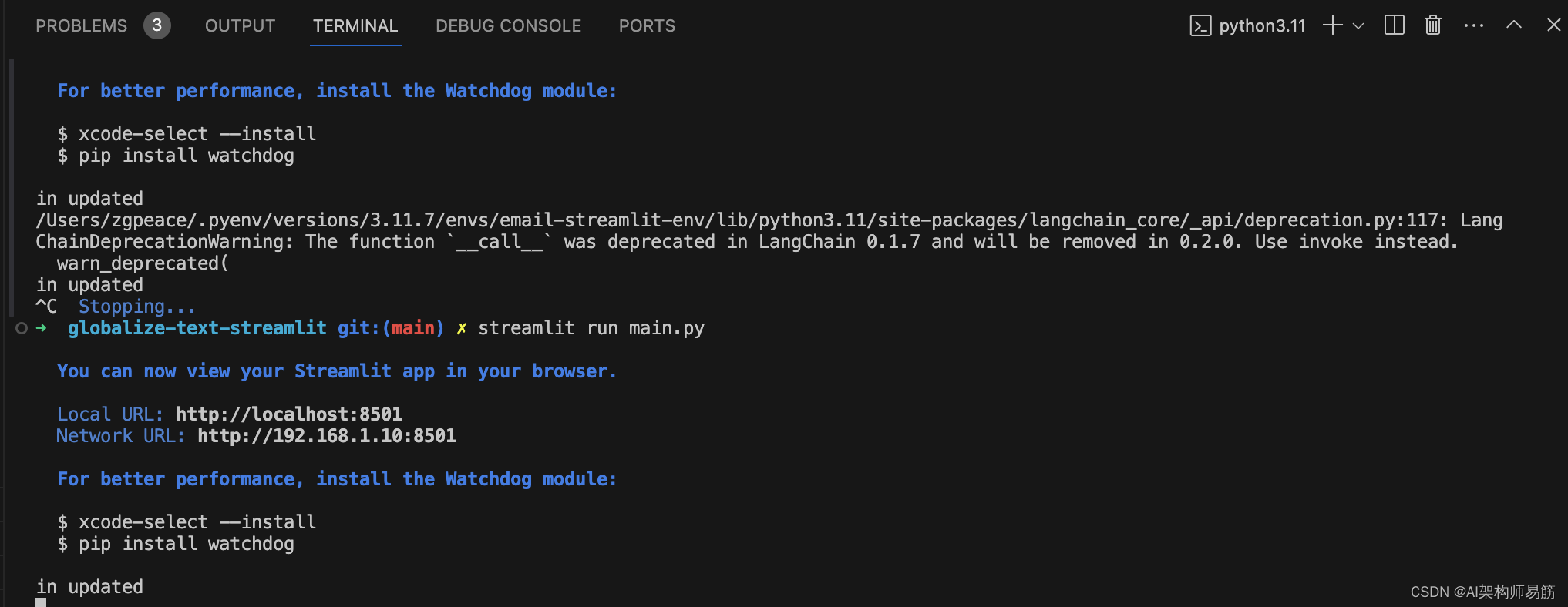
浏览器打开,输入需要优化的email,Command+Enter 即可调用OpenAI api并返回结果。
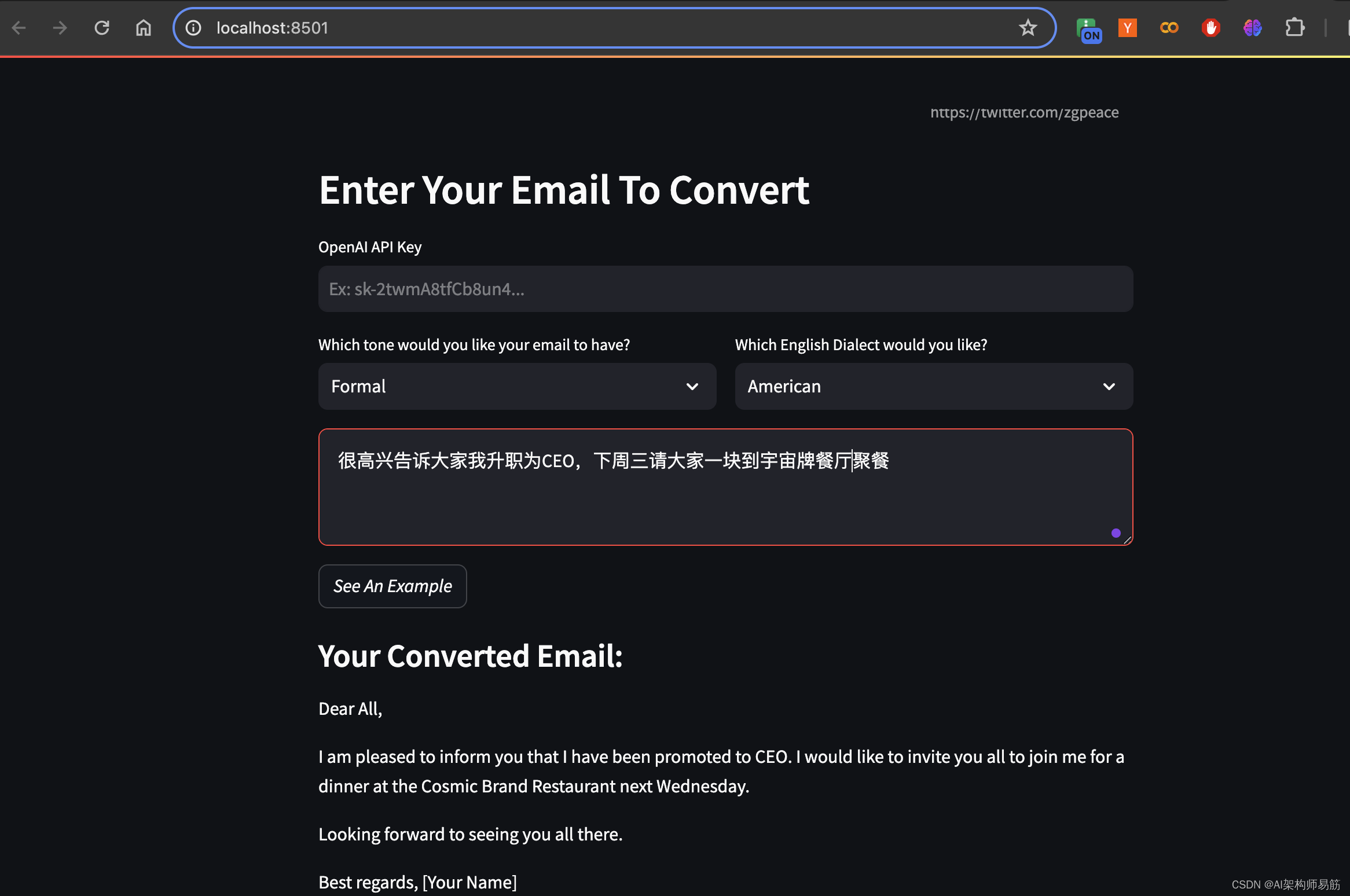
2. 部署到streamlit
2.1 点击 New app
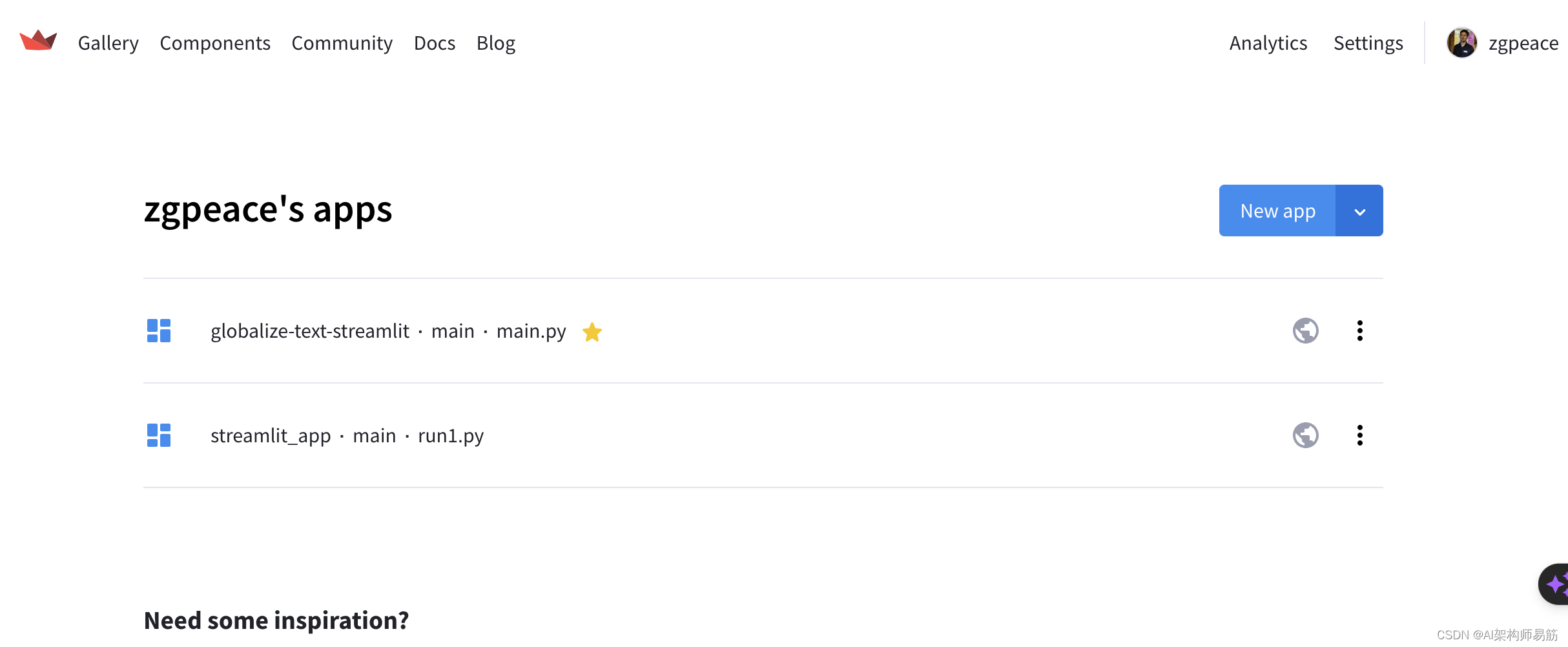
2.2 选择自己的repo, 修改main.py 为Main file path
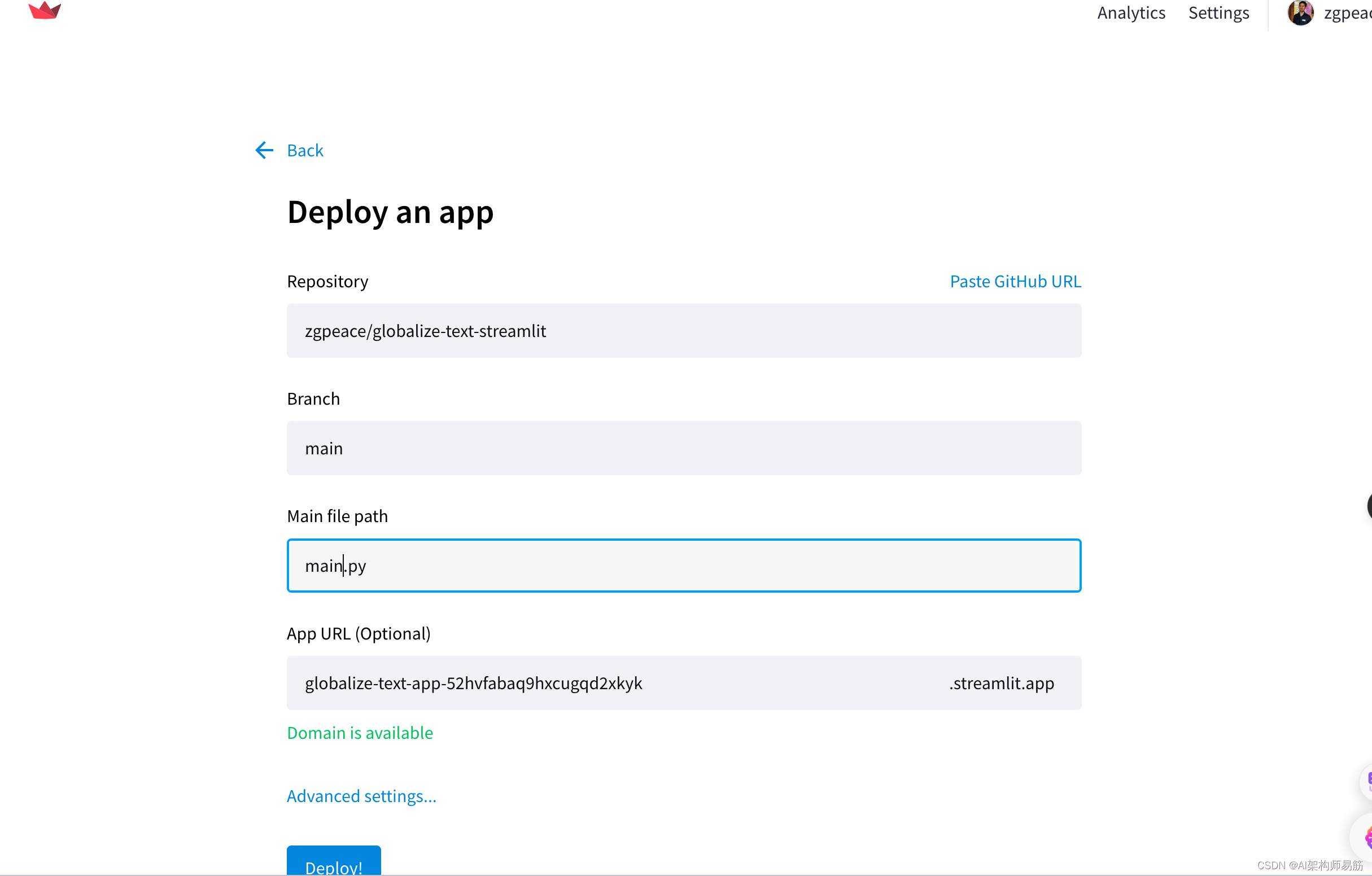
2.3 Advanced settings 设置
OPENAI_API_KEY="sk-xxxx"
OPENAI_API_BASE="https://apejhvxcd.cloud.sealos.io/v1"
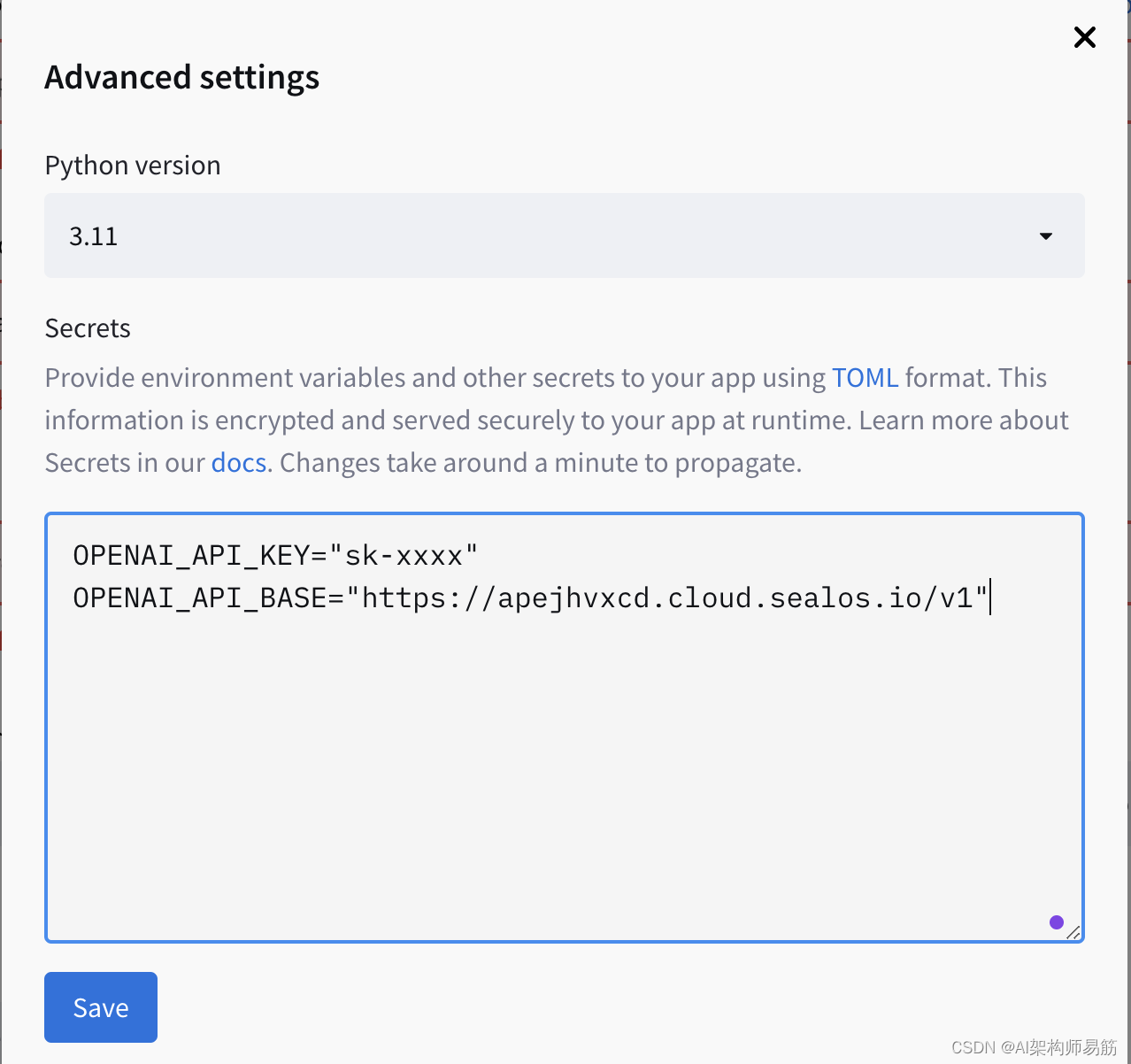
Save 并 Deploy
2.4 等待部署完成即可访问
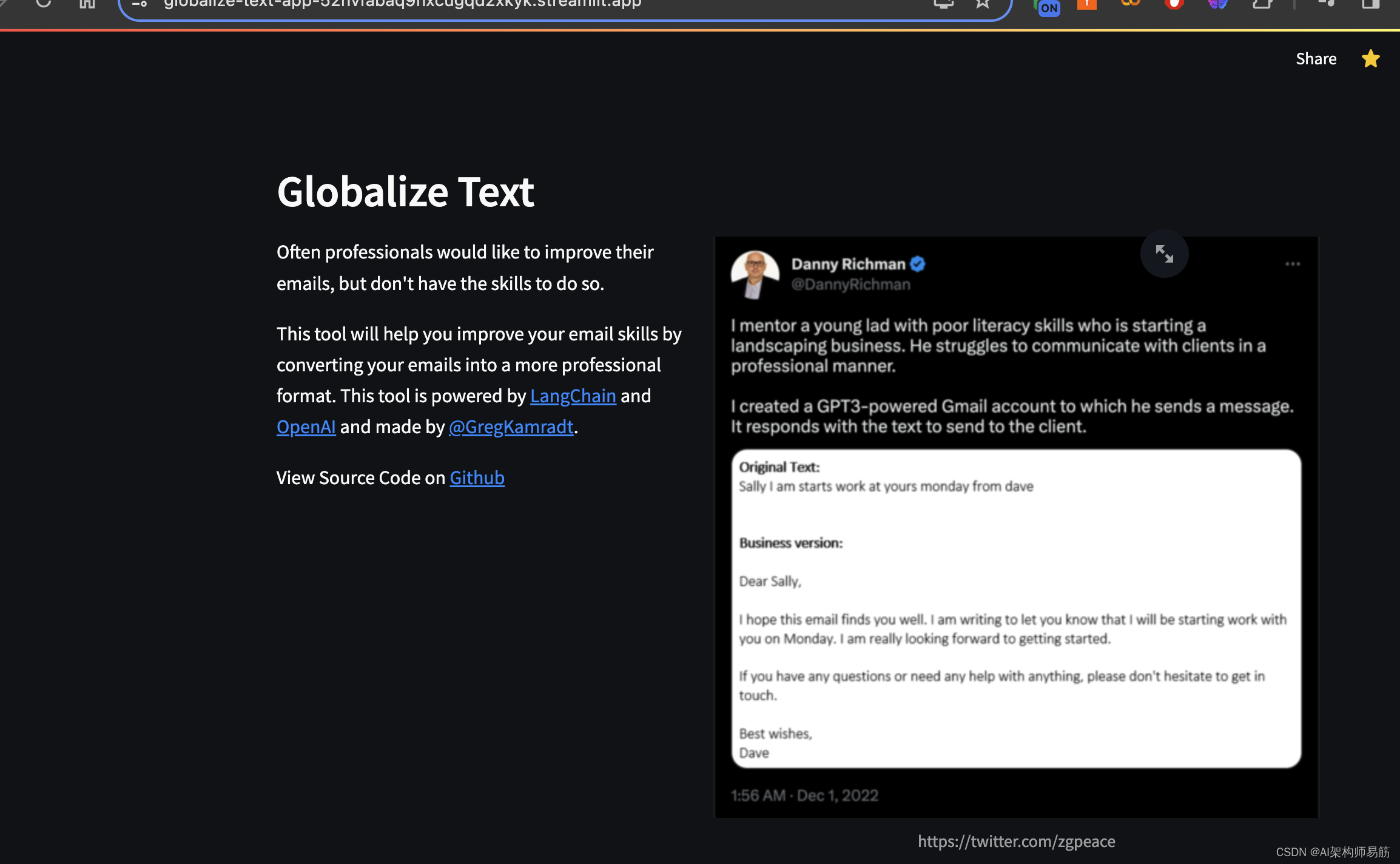
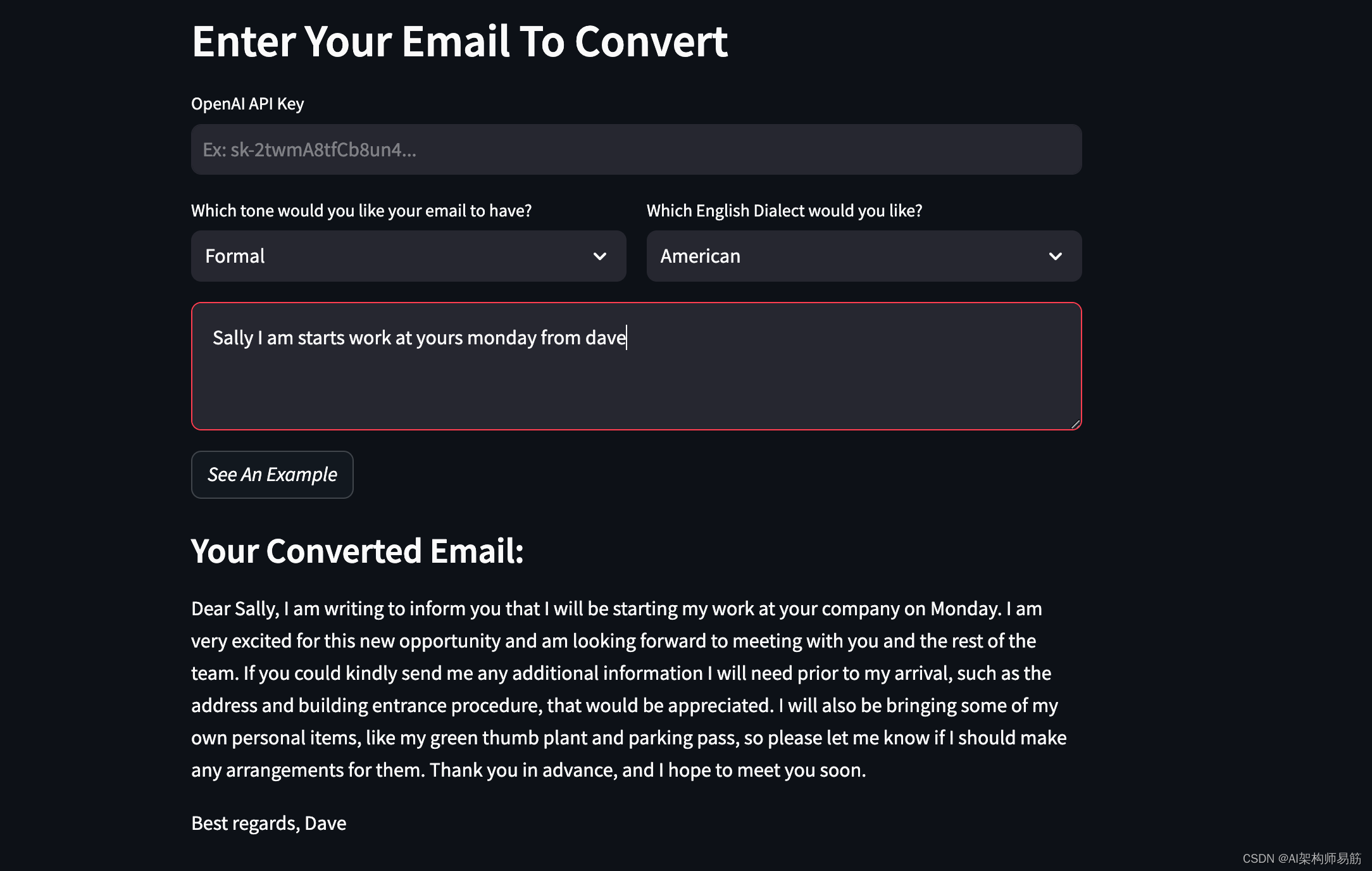
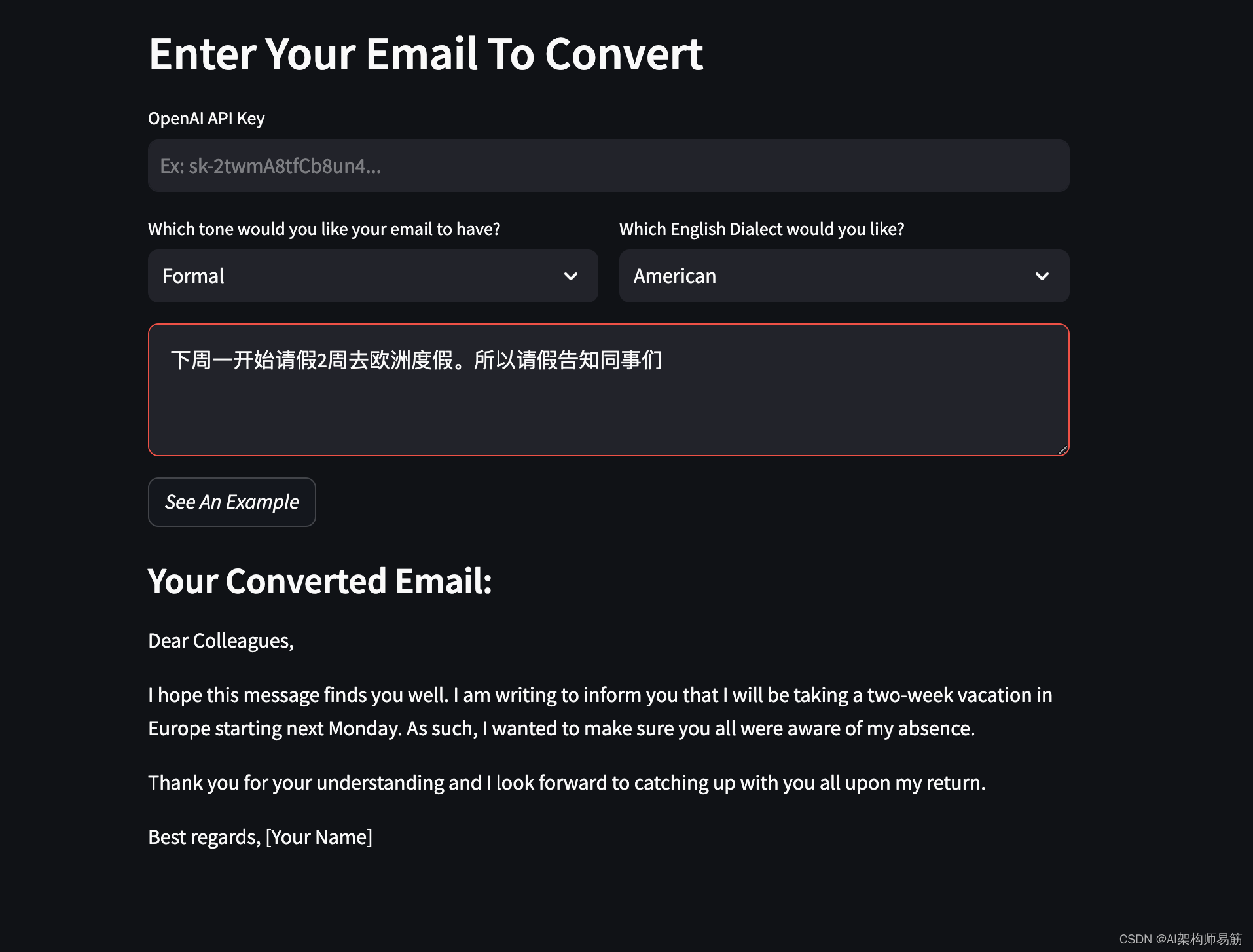
查看实时应用程序:https://globalize.streamlit.app/
此代码的制作过程视频:https://www.youtube.com/watch?v=U_eV8wfMkXU
文章来源:https://blog.csdn.net/zgpeace/article/details/135641035
本文来自互联网用户投稿,该文观点仅代表作者本人,不代表本站立场。本站仅提供信息存储空间服务,不拥有所有权,不承担相关法律责任。 如若内容造成侵权/违法违规/事实不符,请联系我的编程经验分享网邮箱:chenni525@qq.com进行投诉反馈,一经查实,立即删除!
本文来自互联网用户投稿,该文观点仅代表作者本人,不代表本站立场。本站仅提供信息存储空间服务,不拥有所有权,不承担相关法律责任。 如若内容造成侵权/违法违规/事实不符,请联系我的编程经验分享网邮箱:chenni525@qq.com进行投诉反馈,一经查实,立即删除!
最新文章
- Python教程
- 深入理解 MySQL 中的 HAVING 关键字和聚合函数
- Qt之QChar编码(1)
- MyBatis入门基础篇
- 用Python脚本实现FFmpeg批量转换
- 前端TS的泛型!!!
- java——网络编程
- P1309 [NOIP2011 普及组] 瑞士轮————C++
- 使用 LLVM clang C/C++ 编译器编译 boost 基础框架类库
- uni-app如何生成骨架屏
- DAB AC-DC变换器的新型电流调制仿真尝试(PSIM)
- Linux日志服务管理
- wagtail的一个简单blog示例
- 基于SSM的双减后初小教育课外学习生活活动平台的设计与实现
- python24.1.19引入模块